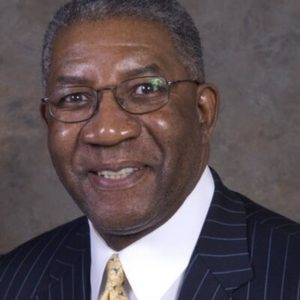An Arkansas judge barred from hearing death penalty cases after attending a rally against capital punishment in his other job as a Baptist pastor claims a three-judge panel rushed to judgment when it dismissed his lawsuit and wants a rehearing before the entire 8th U.S. Circuit Court of Appeals.
In a petition filed July 16, Judge Wendell Griffen, also pastor of Cooperative Baptist Fellowship-affiliated New Millennium Church in Little Rock, Arkansas, alleges a “clear procedural error” in a 2-1 decision handed down earlier this month dismissing his First Amendment claims.

Wendell Griffen
Griffen says the panel misused its authority to issue a writ of mandamus, a “drastic and extraordinary” measure by which a superior court orders a lower court within its jurisdiction to do something specific – in his case directing U.S. District Judge James Moody to dismiss Griffen’s case with prejudice, a final judgment that bars him from bringing other action on the same claim.
Intended for cases where a subordinate judge has usurped his or her authority and allowing litigation to continue would have unintended consequences, Griffen says the panel erred in granting a mandamus petition in what was nothing more than an “interlocutory appeal” by justices of the Arkansas Supreme Court challenging the lower court’s April 12 decision that Griffen stated a plausible claim and the lawsuit could move forward.
Rather than returning the justices’ procedural complaints to the district court, which is better situated to adjudicate such matters, Griffen says the appellate panel leapfrogged to the merits of his claims, without the benefit of listening to his side of the argument.
In his original lawsuit, Griffen claimed the state Supreme Court justices violated his First Amendment rights when they permanently barred him from hearing death penalty cases in retaliation for his participation in an anti-death penalty vigil on Good Friday in 2017. Joining other members of his church, Griffen lay motionless on a cot in silent prayer in what he described as an act of solidarity of Jesus, who was executed by a secular power.
Griffen did not wear his judicial robe or otherwise identify himself as a judge at the protest of Arkansas’ planned execution of seven death row inmates in 11 days beginning the week after Easter, but he was recognized by local media who took his picture and used it in their coverage of the rally.
Earlier in the day Griffen had signed a temporary restraining order prohibiting the state from using one of the three drugs in the execution protocol after the drug’s manufacturer claimed officials obtained it under false pretenses and demanded that it be returned.
Griffen described it as a property dispute that had nothing to do with his personal views on the death penalty. The Arkansas Supreme Court disagreed, not only vacating his restraining order but disqualifying him from all cases involving the death penalty. Griffen then sued the justices, claiming First Amendment retaliation, denial of rights of due process and equal protection under the law and a civil conspiracy targeting him because of his race.
As a pastor and blogger, Griffen has been vocal on a number of social issues. One year at the CBF General Assembly, he spoke passionately against secrecy in today’s methods of execution in a panel discussion opposing the death penalty.
Griffen says even though he personally views the death penalty as immoral, he still can rule impartially on matters of law. Defenders say he doesn’t have to surrender his religious beliefs or exercise in order to serve in government. Critics say stating such open views are a violation of judicial restraint and undermines confidence in the integrity of the legal system.
Before his election in 2010 as a county judge, Griffen served 12 years on the Arkansas Court of Appeals. In his dual role as a pastor he addressed controversies involving racial diversity at the University of Arkansas, the war in Iraq, the U.S. response to Hurricane Katrina and policies of President George W. Bush. Voters removed him from office when he sought re-election in 2008.
Previous stories:
Court upholds decision barring pastor/judge from death penalty cases
Pastor/judge repeats controversial death penalty protest
Pastor/judge can sue justices, but not state Supreme Court, judge rules
Second judge challenges secrecy of drugs used in capital punishment
Pastor/judge threatened with impeachment says his critics ignore the Constitution
Judge disputes claims that his death penalty protest violated judicial impartiality
Arkansas plan to execute 7 men in 11 days strengthens faith, death penalty opposition
